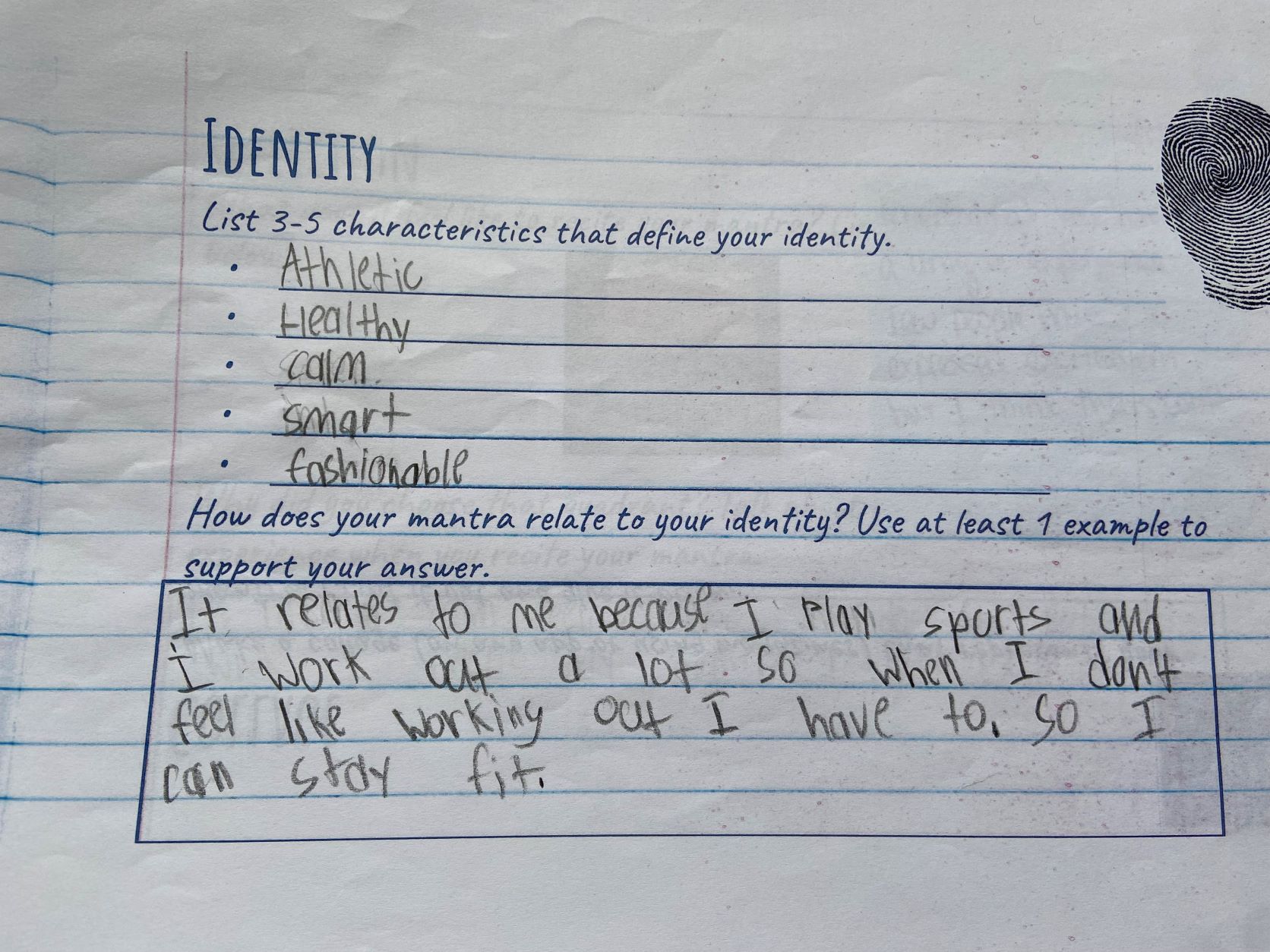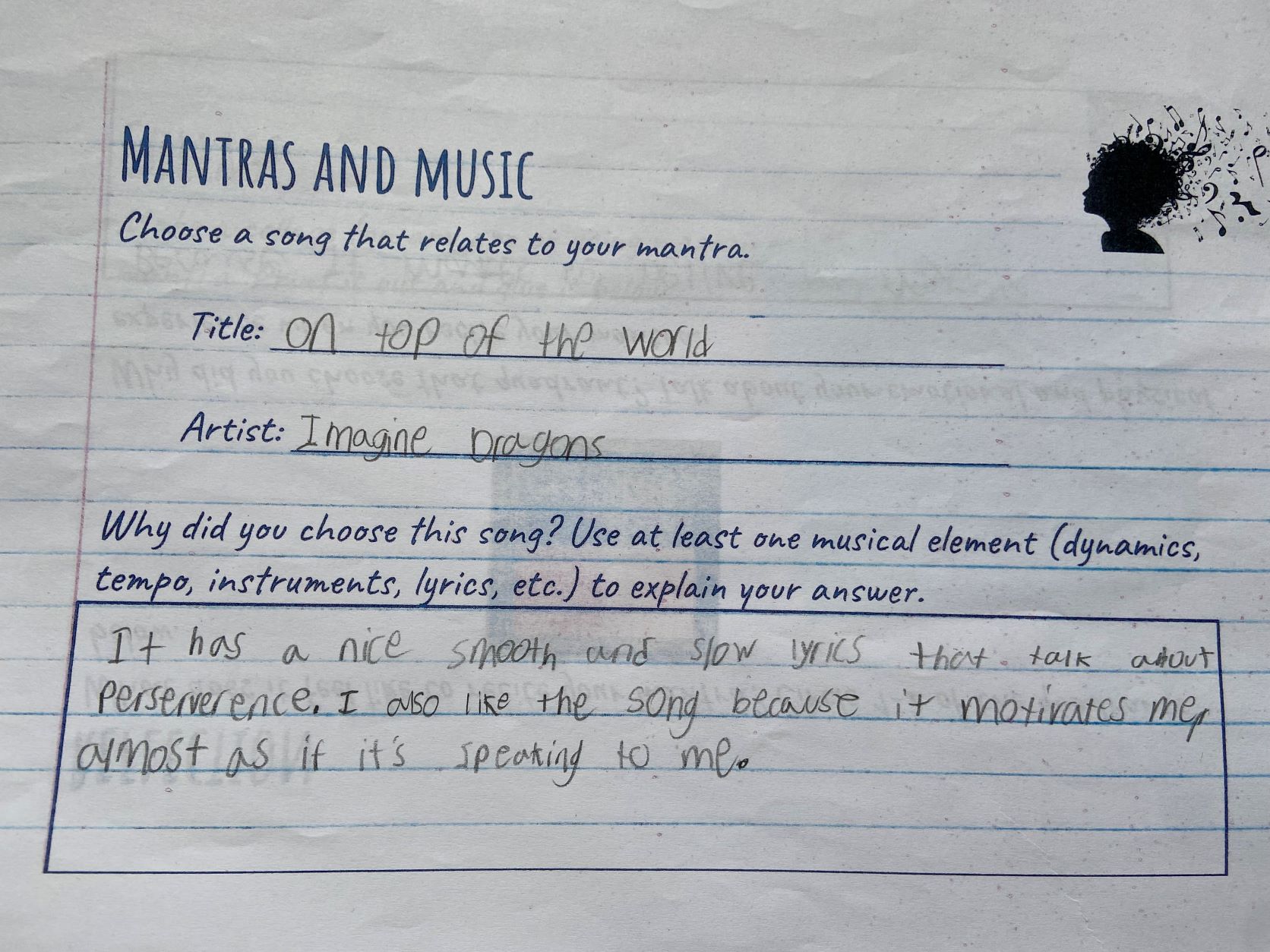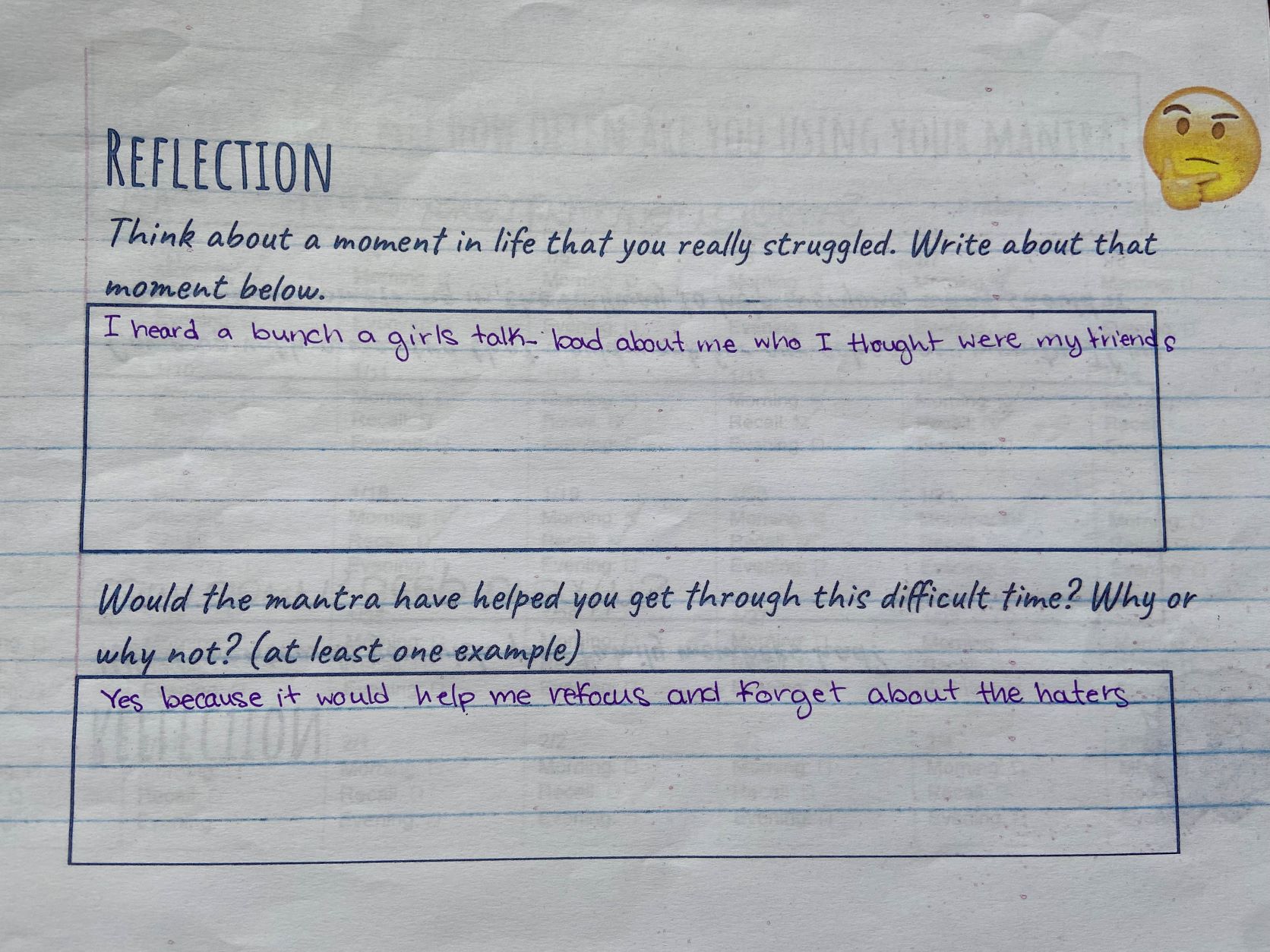Even in the best of times, teaching middle school is full of ups and downs, challenges and successes; but when you throw a pandemic in the mix, it completely changes the experience for both teachers and students. As a middle school music teacher completing a graduate program at Erikson Institute, I wanted to learn more about the pandemic’s effects on students. The result has been an action research project focused on how the pandemic impacted adolescents’ executive functioning skills.
Since returning from remote learning, students have struggled with emotional control, sustaining their attention, and persevering when schoolwork is difficult or uninteresting, which researchers are labeling as the “learning loss” phenomena (Dorn, 2021). These are a few of the many executive functioning skills needed to be successful in middle school. Executive functioning (EF) is the term used to describe cognitive skills that are required for problem-solving, building memory, controlling impulses, and practicing flexibility (Carlson, et al., 2013). Based on this last year of teaching, we need to discuss how to help students build their executive functioning skills before we can bridge any loss in academic knowledge.
Our school has seen an uptick in challenging behaviors this year with more students demonstrating aggressive behaviors not seen before in these numbers. Students are talking back more to the adults in the building, refusing to do assignments, displaying verbal abuse, and even physical aggression toward each other and adults. The difficult adolescent behaviors that I navigated on a somewhat regular basis previously have been multiplied and amplified this year. I wanted to find a solution that would help improve my classroom experience and that of my students.
An Intervention: Overview
Instead of resorting to punitive consequences, I wanted to try an intervention alongside my music curriculum that would help students become more self-aware of their EF skills and in control of their behaviors. I have expertise with mindfulness and meditation and was successfully using these techniques before the pandemic. I have also conducted some research on brain-based techniques of learning, and the two ideas came together to center on mantras. A mantra, which originates from Eastern cultures, means a word or phrase that is repeated to oneself. Psychologists and educators have used mantras or self-talk to help people improve self-regulation and self-management based on the idea that how we feel and act in a given situation depends on what we tell ourselves in the moment (Dawson & Guare, 2010). With this knowledge of mantras, I designed a six-week intervention curriculum for my middle school music students in grades 6 and 8 to help them improve their skills in self-control, perseverance, and attention.
First, I measured the students’ EF skills at the beginning of the curriculum unit and at the end using a self-assessment survey (Appendix A) derived from the work of Dawson and Guare (2010). After I analyzed the pre-survey data, I noted a growth area for each student in these three EF skills:
- Self-control,
- Perseverance, or
- Attention
Most students chose their growth area based on the results of the assessment, but a few students from each class chose a growth area based on their interests. Once they determined their growth area, I taught a lesson on mantras, gave them historical context, and provided examples of mantras being used in pop culture. I am a huge Disney fan, so I used mantras like “Just keep swimming” from Finding Nemo and “Silencio Bruno” from Luca. I then gave them a list of mantras to choose from or allowed them to create their own (see Appendix B). After choosing their mantras, we immediately wrote them down five times in a row on lined paper to reinforce the idea in their head. Over the course of several weeks, I gave mini lessons on the three EF skills and how these skills correlate with the mantras. Then the students reflected on their mantras through journaling exercises (Appendix C), which will be discussed in more detail below.
Executive Functioning Mini Lessons and Reflection Journal
Before teaching the students about each skill, I defined executive functioning and showed them a YouTube video to explain it in more detail (Parent Lab, 2020). I gave them other examples of EF skills including organization, time management, planning, working memory and cognitive flexibility. We talked about why these skills are important in school and beyond: self-control is the ability to control how you respond, especially when stressed or angry; perseverance is never giving up even when things are difficult; and attention is being able to keep your mind focused on one thing at a time. I then taught three mini lessons, one for each of our focus EF skills. Students received an overview of each skill and applied it to an interactive activity. The mini lessons proved to be engaging and successful in helping the students understand EF.
To accompany the recitations of the mantras and EF mini lessons, I created a mantra journal for students to reflect on their journey. There was one prompt per page and each page had pictures and space to write and reflect. The journal also included two pages of calendars for students to record how frequently they recited their mantras during the school day and at home. The students wrote about why they chose their mantras and how the phrases connected with their lives and emotions. We also connected with music and art by having each student choose a song that related to their mantra and then creating a collage that represented their mantra. Here are some examples of student journal entries below.
When providing feedback to me at the end of the study, only a few students said that journaling was an enjoyable part of the process, but the majority did not find the journal to be a beneficial exercise. However, after grading the students’ journals based on effort, the data showed that students who wrote more in their journals were more likely to improve their scores in their growth area. Even though they may not have enjoyed the process, based on this study the journal was an important element to their improvement.
Lessons Learned and Application for Your Classroom
Even though most of the students enjoyed participating in the curriculum, they also expressed that they would have benefitted from it more if they had more reminders to say their mantras throughout the school day. Therefore, I would advise that this curriculum be implemented in a community building or advisory setting where all teachers in the building are involved in the project and reminding students throughout the day to recite their mantras. I saw my students once a day for 40 minutes and had to balance the mantra curriculum with my music lessons. If more teachers were involved, students would have more support in identifying moments throughout their day where they had to apply these skills. The more they recite the mantras, the more likely it would be that they would recite them unprompted by an adult.
There are also several ways to integrate the mantra intervention into academic curriculum. Reading and Language Arts teachers can use mantras during character analysis activities by assigning students to find a mantra that could help a character overcome an obstacle in a story. Social studies teachers could ask students what EF skill was most important to specific historical figures and what mantras might have helped them. Students in art could create collages, sculptures, or paintings that represent their mantra, and music students can compose a song that expresses the emotions of their mantras. In the end, a mantra unit can be interdisciplinary and used in several content areas while also building a school’s mission and vision.
When I use this mantra intervention in the future, the two methods I will focus on improving are application and reinforcement. The students needed more help applying the EF skills and mantras to everyday situations. We did a lot of reflecting on why mantras were important, but some students expressed that they wanted to focus more on applying the mantras to their lives. Involving other teachers into the intervention might also help the students make the connection of what other situations they can apply their mantras to or increase awareness of self-control, perseverance, and attention and when they need to use these skills. Additionally, it might help to have visual reminders of their mantras, like bracelets or stickers with their mantra, and posters around classrooms and hallways.
Over the last several years, I have realized how important it is for teachers and parents to work together to help our students. Middle school is when adolescents start to have more teachers because the school subjects are more specialized, but teachers need to collaborate on how to keep teaching executive functioning skills to help children succeed in all areas. I believe that this curriculum would have a greater effect on helping students if it was a school-wide initiative so students are reminded several times a day to recite their mantras. And it would be even better to involve parents in the process and have teachers choose mantras to recite as well. As a society we are seeing the effects the pandemic had on younger generations, and in addition to focusing on closing gaps in achievement we need to bring attention to the gaps in executive functioning in our students.
Meghan Hickey is a general music and choir teacher in Skokie, IL. She received her bachelor’s degree in music education at the University of Illinois at Urbana-Champaign and a Masters of Science in child development at Erikson Institute in Chicago. She also co-authored Portraits of Music Education and Social Emotional Learning, a book about implementing SEL into the music curriculum. SEL and Culturally Responsive Teaching have become important parts of her teaching practices as she learns more about what is needed to effectively teach adolescents from diverse cultural backgrounds.
References
- Carli, Julie. (2018). Remembrance For Walter Mischel, Psychologist Who Devised The
- Marshmallow Test. NPR. Retrieved from https://www.npr.org/sections/health-shots/2018/09/21/650015068/remembrance-for-walter-mischel-psychologist-who-devised-the-marshmallow-test
- Carlson, S. M., Zelazo, P. D., & Faja, S. (2013). Executive function. In P. D. Zelazo (Ed.), The
- Oxford handbook of developmental psychology (Vol. 1): Body and mind (pp. 706–743). Oxford University Press.
- Dawson, Peg & Guare, Richard. (2010). Executive Skills in Children and Adolescents: A
- Practical Guide to Assessment and Intervention (2nd ed.). Guilford Press. New York City, NY.
- Dorn, Emma; Hancock, Bryan; Sarakatsannis, Jimmy; and Viruleg, Ellen. (July 27, 2021).
- COVID-19 and education: The lingering effects of unfinished learning. McKinsey & Company. Retrieved from https://www.mckinsey.com/industries/education/our-insights/covid-19-and-education-the-lingering-effects-of-unfinished-learning
- Mind in the Making. (2020). The 7 Essential Life Skills Every Child Needs. Bezos Family
- Retrieved from https://www.mindinthemaking.org/life-skills
- Parent Lab. (2020, April 6). What is Executive Function? Retrieved from
- https://www.youtube.com/watch?v=nHV_9EZFfwk
- Probst, Jeff (Producer). (2015, December 16). Lie, Cheat and Steal (Season 31, Episode 14) [TV series episode]. Survivor: Cambodia. CBS.



